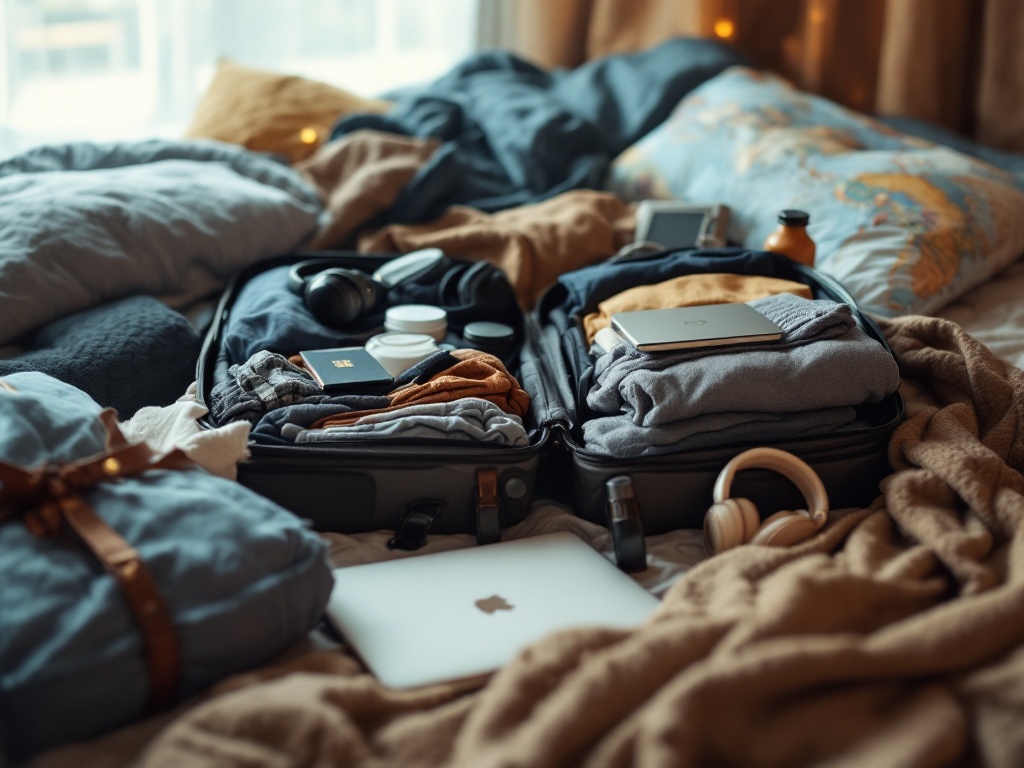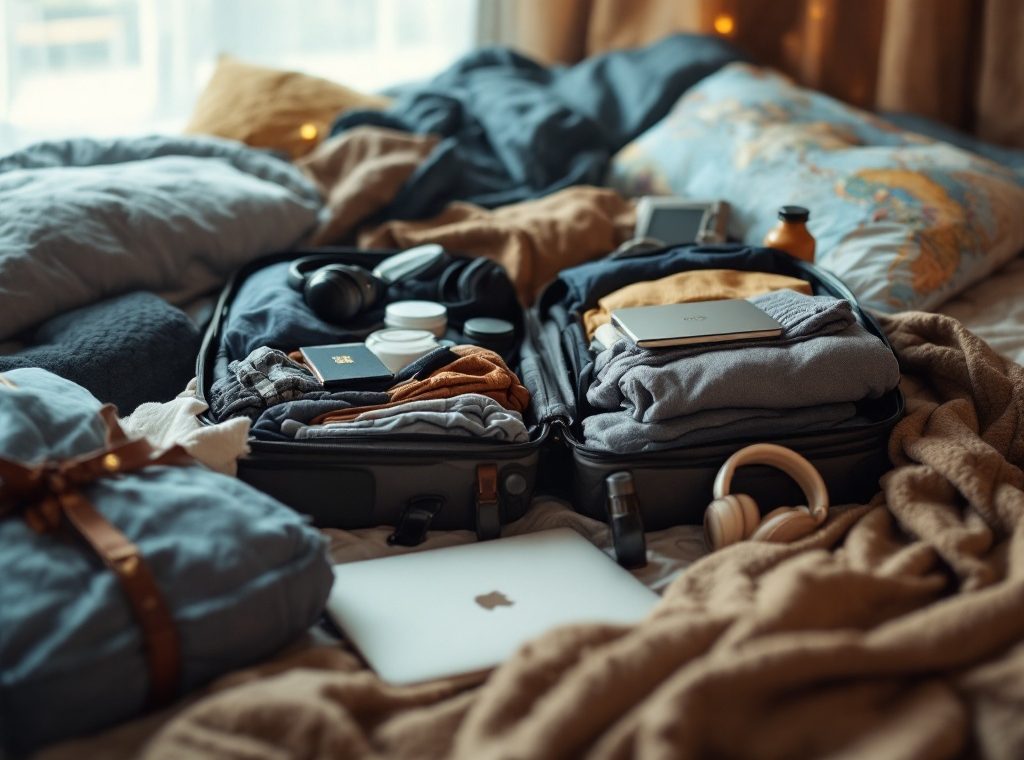Packing Smart: Essential Study Abroad Travel Essentials for Students
Embarking on a study abroad adventure? Ensure a smooth journey by mastering the art of packing smart. This guide covers everything from essential documents and versatile clothing to health precautions and tech must-haves. Learn how to utilize packing cubes, conquer overpacking, and safeguard your valuables. Prepare for an enriching experience by discovering crucial tips and avoiding common packing pitfalls. Start your adventure prepared and stress-free!
Important information

- Essential documents: Pack your passport, visa, acceptance letter, travel insurance details, and medical records. Make copies of these important documents.
- Research your destination: Learn about the climate, cultural norms, and local customs regarding clothing and personal items. Understand the local regulations for any medications you are bringing.
- Pack light and smart: Use packing cubes to organize and maximize space. Roll your clothes instead of folding them. Bring versatile clothing items suitable for layering and various activities. Don’t overpack.
- Health and safety: Prepare a first-aid kit with essentials like bandages, antiseptic wipes, pain relievers, and any personal prescriptions. Include over-the-counter medications for common ailments.
- Electronics and finances: Bring a portable charger, necessary adapters, and converters for your electronics. Carry a money belt and an RFID-blocking wallet to protect your cash, cards, and identity.
Understanding Packing Essentials for Study Abroad
Planning a successful study abroad experience starts with packing smart. Consider these key aspects to ensure a safe and comfortable trip:
Essential Items
- Important documents (passport, visa, acceptance letter),
- Versatile travel supplies (adapters, chargers, first-aid kit),
- Key personal items (medications, toiletries).
Research and Planning
- Destination’s climate and cultural norms,
- Planned activities,
- Local customs and regulations on clothing and personal items.
Finally, create a comprehensive packing list to avoid overpacking while ensuring you have everything you need.
What Important Documents to Pack
Remember your passport and visa, as both are crucial for your trip.
Make photocopies of your passport and visa as a backup.
Ensure you have your student visa and your school’s acceptance letter.
Pack your travel insurance details and medical records to safeguard your health and well-being.
Passport and Visa Necessities
Secure a valid passport. Ensure your passport’s validity extends beyond your intended stay abroad.
Obtain a student visa. This is crucial for legal entry and residence in your host country.
Keep your acceptance letter handy. This document confirms your enrollment and is often required for visa applications.
Make copies of vital documents. Duplicate your health and travel insurance, passport, and other important papers to safeguard against loss or damage.
Prepare an emergency contact list. Create digital and physical copies, including local and international emergency numbers.
Why Foreign Currency is Essential
Having some local currency on hand is advisable for immediate expenses upon arrival, such as snacks and transportation to your hotel. Airport exchange rates are often unfavorable, so it’s wise to plan ahead. Carrying local currency also shows respect for the local culture and demonstrates your preparedness for the trip, a small gesture that can make a positive impression.
Final Preparations for Your Study Abroad Journey
Gather essential documents, including your passport, visa, and university acceptance letter.
Ensure your health insurance and immunizations are up-to-date.
Collect your academic transcripts and necessary school supplies.
Compile emergency contact information for peace of mind.
Emergency Contacts and Health Insurance Details
Maintain a readily available list of emergency contacts:
- family,
- friends,
- program advisor,
- your embassy or consulate.
Ensure easy access to your health insurance information:
- policy numbers,
- international contacts.
Carry this crucial data both physically and digitally.
Ensuring Your Academic Transcripts and School Supplies Are Ready
Gather your official academic transcripts, notebooks, pens, and a laptop. These items are essential for your studies abroad.
Organizing Your Luggage and Carry-On
Packing List
Create a categorized packing list:
- clothing,
- toiletries,
- electronics,
- documents.
Prioritize based on weather and planned activities.
Tips and Essentials
Packing cubes are invaluable for organization and space maximization. They compress clothing and keep everything tidy.
Roll clothes instead of folding to save space and minimize wrinkles, allowing you to pack more.
A laundry bag is essential for separating dirty clothes from clean ones, maintaining organization and preventing germ spread.
Protecting Your Valuables
Safeguard valuables with a money belt (worn under clothing) for cash and documents, and an RFID-blocking wallet to protect credit cards from electronic theft.
How to Create an Efficient Packing List
Categorize your items into clothing, toiletries, electronics, and documents.
Use packing cubes to organize and maximize space.
Roll your clothes instead of folding to save space and pack versatile items.
Keep in mind airline weight restrictions.
Make a checklist of essential items to avoid forgetting anything.
Leave some room for souvenirs.
Using Packing Cubes for Efficiency
Packing cubes are a traveler’s best friend for organizing luggage. They neatly compartmentalize everything from clothes and electronics to toiletries and important documents, maximizing space and keeping things tidy. Even better, they make finding specific items a breeze, eliminating the need to unpack your entire bag. Using packing cubes offers several key benefits:
- Superior organization: they keep items neatly sorted and prevent your luggage from becoming a jumbled mess,
- Maximized space: compress clothing and other items to fit more in your bag,
- Easy access to items: quickly locate what you need without unpacking everything,
- Protection for belongings: safeguard delicate items from damage and wrinkles,
- Simplified packing and unpacking: streamline the entire process and reduce travel stress.
Rolling Clothes to Save Space
Save space and prevent wrinkles by rolling your clothes instead of folding them. This technique is particularly effective with lighter fabrics.
Bringing a Laundry Bag for Organization
Studying abroad? Don’t forget a laundry bag! It’s essential for separating dirty clothes, making packing and laundry day much easier. This small addition keeps your suitcase organized and hygienic. A simple solution with a big impact.
Using a Money Belt and RFID Blocking Wallet for Security
Money belts discreetly conceal cash and cards beneath clothing, thwarting pickpockets. RFID blocking wallets add another safeguard, preventing thieves from electronically scanning credit cards and passports containing embedded RFID chips. This technology protects both your finances and identity from digital theft.
Choosing the Right Clothing and Accessories
Pack light, versatile clothing for a comfortable study abroad experience. Choose easy-to-layer items like basic tops, jeans, and a light jacket. Consider the local climate and cultural norms when selecting outfits. Comfortable shoes are essential for all the walking and exploring you’ll do. Bring a mix of casual and formal wear to be ready for anything, from classes to evenings out. Useful accessories like scarves or hats can add flair, but avoid overpacking.
Clothing
- pack light, versatile items,
- choose easy-to-layer pieces like basic tops, jeans, and a light jacket,
- consider the local climate and cultural norms.
Footwear and Accessories
- comfortable shoes are essential,
- bring a mix of casual and formal wear,
- useful accessories like scarves or hats can add flair, but avoid overpacking.
Lightweight and Versatile Clothing
Packing for your study abroad adventure requires a strategic approach to clothing choices. Prioritize versatile items that can be mixed and matched for various activities and weather conditions. Layering is essential, so pack lightweight tops, a warm sweater, and a waterproof jacket. Comfortable shoes are crucial for walking and exploring, while a dressier pair might be needed for special occasions. Research your host country’s cultural norms regarding clothing to ensure respectful and appropriate attire, especially for religious sites or formal settings. Consider these packing tips for a comfortable and culturally sensitive experience:
Clothing
- Choose versatile items that can be mixed and matched.
- Pack lightweight tops for layering.
- Include a warm sweater and a waterproof jacket.
Footwear and Cultural Sensitivity
- Pack comfortable shoes for everyday exploration.
- Bring a dressier pair for special occasions.
- Research your host country’s cultural norms regarding clothing, especially for religious sites or formal settings.
Respecting Local Cultural Norms
When preparing your travel wardrobe, consider local customs and dress codes to demonstrate respect. Pack versatile items, like a simple dress that can be styled up or down. Factor in the weather and your planned activities to ensure comfort and appropriateness.
Packing Comfortable Footwear
Comfortable shoes are essential for all the walking you’ll do while studying abroad. Pack versatile footwear suitable for various activities and weather conditions. Sturdy walking shoes or sneakers are a must. For warmer days, sandals or flip-flops will be perfect. In contrast, boots are ideal for cold or wet weather. Most importantly, break in your shoes before your trip to prevent blisters and ensure your adventures aren’t hampered by sore feet.
Essential Footwear for Studying Abroad
- Sturdy walking shoes or sneakers are a must for all the walking you’ll do.
- Sandals or flip-flops are perfect for warmer days.
- Boots are ideal for cold or wet weather.
Tip for Comfortable Travel
Break in your shoes before your trip to prevent blisters and ensure your adventures aren’t hampered by sore feet.
Personal Care and Hygiene Essentials
Packing light is key for a stress-free study abroad experience, and travel-sized toiletries are essential. Bring the essentials: shampoo, conditioner, soap, toothbrush, toothpaste, and deodorant. Maintain your skincare routine with travel-sized containers to save space and meet airline regulations. Sunscreen is vital, especially in sunny locations. A reusable water bottle is a must for hydration and eco-friendliness. Here’s a packing list to help you prepare:
- Toiletries: shampoo, conditioner, soap, toothbrush, toothpaste, and deodorant.
- Skincare: travel-sized versions of your regular products.
- Sun protection: sunscreen.
- Hydration: reusable water bottle.
Travel-Sized Toiletries to Pack
Pack smart by using travel-sized toiletries like shampoo, conditioner, soap, toothpaste, and a toothbrush. Maintain your skincare routine and bring a reusable water bottle. Consider your destination and pack any hygiene products that might be hard to find locally. Keep these essentials in your carry-on for easy access.
Importance of Sunscreen for Sun Protection
Protecting your skin’s health requires sunscreen. It shields against the sun’s harmful ultraviolet (UV) rays, reducing the risk of sunburn and preventing long-term issues like premature aging and skin cancer. It’s particularly important when you’re outside, especially in sunny climates. Remember to apply it generously and frequently.
Hydration with a Reusable Water Bottle
Staying hydrated is crucial, especially when traveling. Carrying a reusable water bottle lets you always have water at hand and helps reduce plastic waste, benefiting both you and the environment.
Electronics and Communication Devices
A portable charger is essential for keeping your devices powered up while traveling. Remember to bring necessary adapters and converters to ensure compatibility with local outlets. For international trips, a universal adapter will simplify things considerably. It’s a worthwhile investment for frequent travelers.
Bringing a Portable Charger
A portable charger is a travel essential, keeping your devices powered up and giving you constant access to important apps like maps and communication tools. This is especially helpful on long trips or when exploring new places, offering invaluable peace of mind. Having a portable charger ensures that you can stay connected and informed, no matter where your adventures take you. It’s a must-have for any traveler.
Adapters and Converters for Electronics
Voltage converters change the outlet’s voltage to match your devices, while adapters simply change the plug’s shape to fit the outlet. Before traveling, check your destination’s voltage and plug type to ensure your devices will work correctly.
Avoiding Common Packing Mistakes
Pack light by bringing only essential items. Before you pack, check the weather forecast for your destination and pack accordingly. A raincoat is a must-have for rainy destinations. Consider your planned activities when choosing what to bring, but always prioritize essential items.
Overpacking: What to Leave Out
Travel light by leaving heavy books at home and opting for digital guidebooks instead. Minimize toiletries to save space and weight, which can be especially helpful when adhering to airline baggage restrictions. Pack smart for a more enjoyable trip.
Leave unnecessary gadgets and duplicate clothing at home. Prioritize versatile clothing items that can be mixed and matched to create different outfits. Formal attire is typically not needed, so focus on comfortable and practical clothing choices.
Ignoring Climate Differences
Understanding your destination’s climate is crucial for a comfortable trip and helps avoid unexpected expenses. Researching average temperatures and rainfall will guide your packing decisions. For tropical destinations, pack light clothing. Colder climates require warm layers and a waterproof jacket. Consider your planned activities to fine-tune your packing list.
Health and Safety Considerations
A well-stocked first-aid kit is crucial for managing minor injuries and common ailments while traveling. Pack essential items such as bandages, antiseptic wipes, pain relievers, and personal prescriptions. Don’t forget over-the-counter medications for allergies, colds, or stomach issues. Before your trip, research your destination’s medication regulations to ensure compliance. Always clearly label and store all medications properly for your safety and easy access.
Essential Items
- bandages,
- antiseptic wipes,
- pain relievers,
- personal prescriptions.
Over-the-counter Medications
- allergy remedies,
- cold medicine,
- stomach relievers.
Prepare a well-stocked first-aid kit with essentials like bandages, antiseptic wipes, and pain relievers.
Include personal prescriptions and over-the-counter medications for allergies, colds, and stomach problems.
Research your destination’s medication regulations before traveling.
Clearly label and store all medications properly for safety and easy access.
How to Assemble a First Aid Kit
A well-stocked first aid kit is crucial for addressing everyday mishaps. Here’s what to include:
- Antiseptic wipes, to clean cuts and scrapes.
- Bandages of assorted sizes, for covering wounds.
- Gauze pads and adhesive tape, essential for wound care.
- Ibuprofen or acetaminophen, for pain relief.
- Anti-diarrheal and motion sickness medications, to address common travel ailments.
- A thermometer, to help monitor fevers.
- Tweezers and scissors, invaluable for removing splinters or cutting bandages.
Should You Pack Over-the-Counter Medications?
When packing your travel essentials, remember to include over-the-counter medications for common ailments. Pack pain relievers for headaches or other aches, antihistamines to manage allergies, and anti-diarrheal medication to address digestive issues. These can be difficult to find in some areas.














